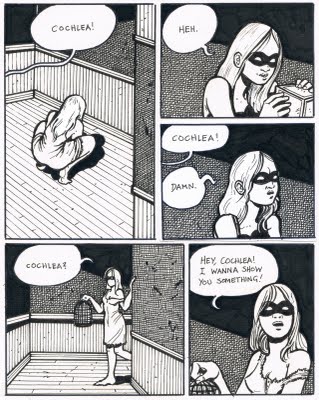 Folly: The CONSEQUENCES of INDISCRETION
Folly: The CONSEQUENCES of INDISCRETION
by Hans Rickheit
Fantagraphic Books, April 2012
144 / $18.99 Buy from Fantagraphics
“The common exclusion of the worst (folly, vice, indolence . . .) seems to me to denote servility. The servile intelligence serves folly, but folly is sovereign: I can change nothing with it.”
—Georges Bataille, Method of Meditation
The folly is my favorite architectural conceit. A building divorced from any sort of purpose, often considered mere decoration; there are architects that have turned the idea of the folly into a sort of space of affect. It seems that the folly gave way to paper architecture, to a developed insistence upon the way space can make someone feel, whether or not the space is constructed out of any sort of desire for utility.
Hans Rickheit’s book, Folly, also serves no utility. Most of the miniature narratives (if you could call them as such), find voided figures wandered through bizarre architectural constructions that seem somewhere between abandoned factory and mad-scientist laboratory, infinite labyrinthine hallways that lead to abject bio-mechanical ‘machines’ that spit out effluvia and viscera. Often, these masses of flesh and organ are alive, they produce sounds, sometimes they serve their own function (often more as that of “sustenance” or offering, battery power), always useless. They are poked and prodded, they squeak and pus.
It is within this in-utility that Rickheit’s graphic tales find their true sense of jouissance. There is no definable morality; as the subtitle of the book suggests “the consequences of indiscretion” are generally moot. Cochlea and Eustachia repeatedly find themselves modified, dead, or turned into tree trunks, but three pages later they’re back for another tale of wonder.
Collecting work from a variety of self-publications & anthologies, Folly presents an introduction into the world of Hans Rickheit that doesn’t required the sustained obsession his longer tales (such as Chloe and the absolutely essential Squirrel Machine) require—one can dip in and out of the beautiful madness that haunts the pages at will, without having to give something up. Though it’s arguable that the giving-up the longer a-narrative sojourns require adds a level of delirium to the experience of the books, even in short form these fragments shock the system with a delicious perversity.
In an age of indie-comics dependent upon the banality of the everyday, a hesitant realism, Rickheit eschews reality in favor of the impossible, a state of existence that is truly fantastical. But this is not a utopia, this is a world entirely of the body, though not only the body of human beings, but the body of all living meat, of anything that breathes and shits. This is a world of pure imagination, of subconscious desires let loose with an acutely detailed drawing style. And ultimately, it’s a perfect work for those who refuse to float away from their bodies but are ready to let their heads go where-ever one can find the new.
Tags: comix, folly, hans rickheit


Great review, Mike. This is easily my favorite graphic novel in a while.
Bill
tinyurl.com/73huk6r